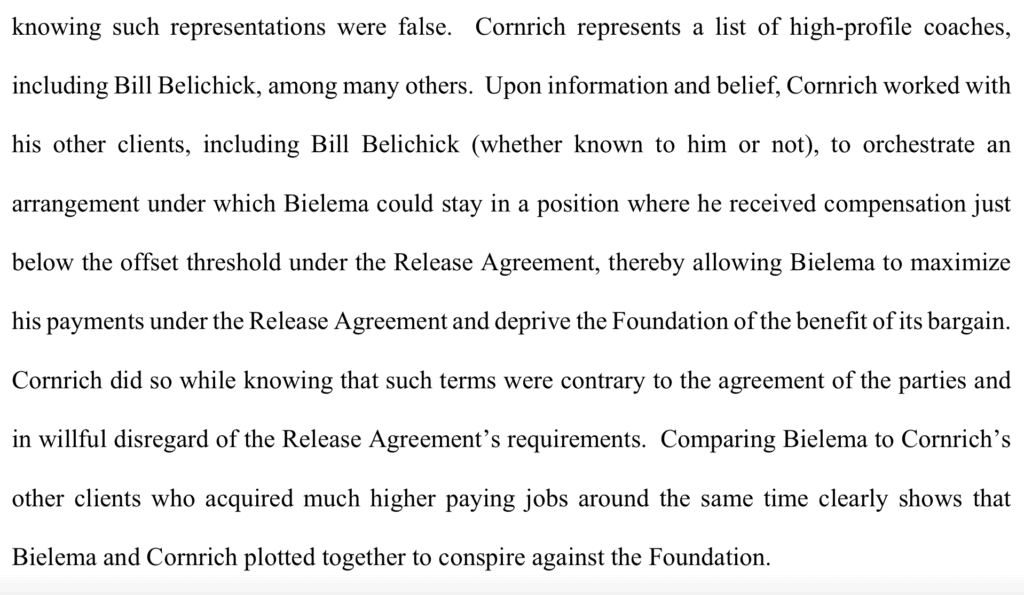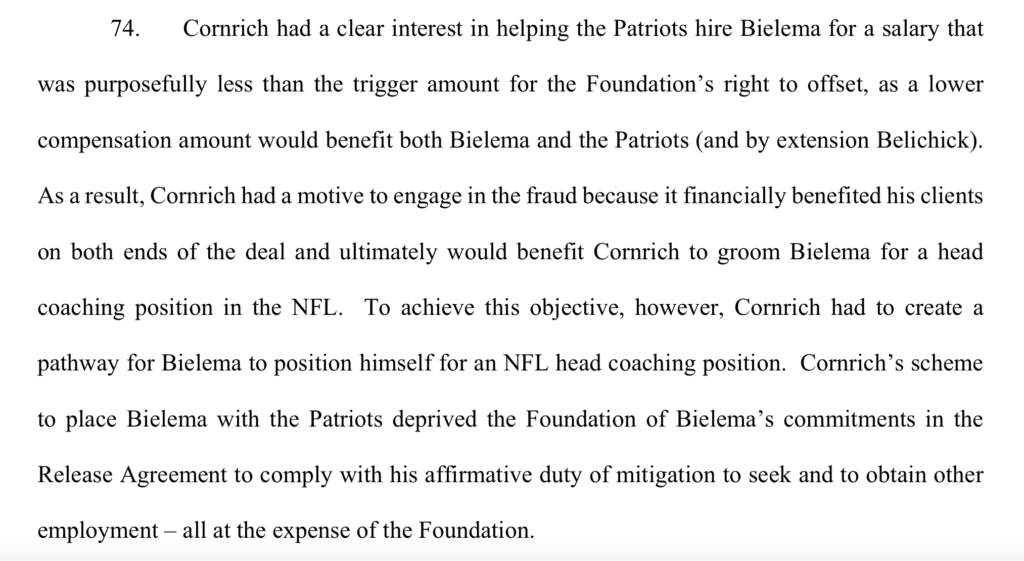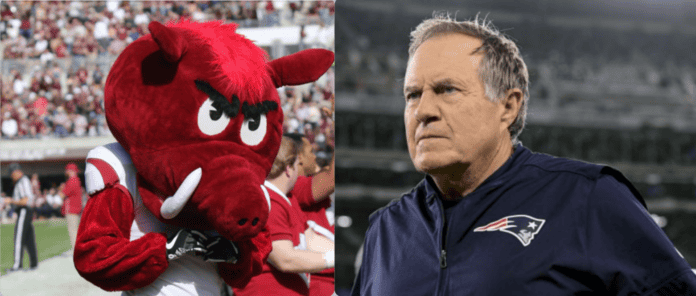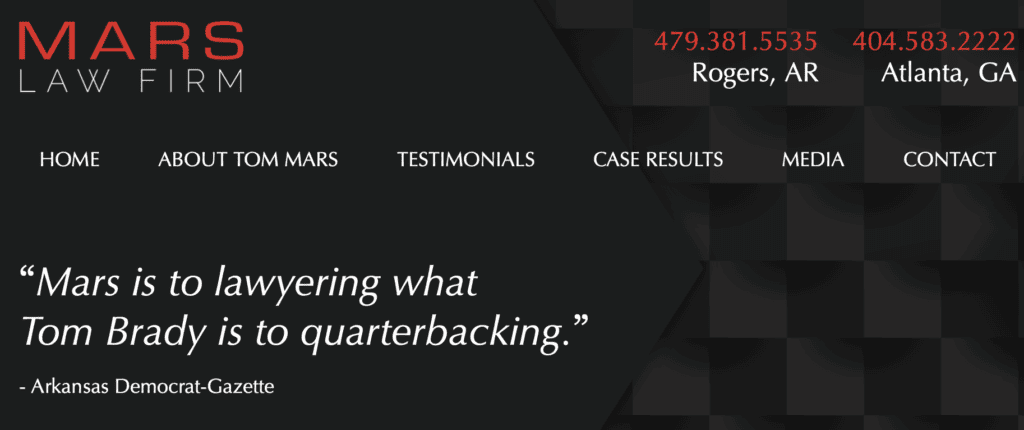One of the greatest coaches in the game of football has moved closer to center stage in the ongoing litigation between Bret Bielema and the Razorback Foundation. In June, Bielema sued the foundation seeking about $7 million he says he’s owed in the wake of the buyout he signed in 2018.
Now Bill Belichick, the head coach of the New England Patriots, has become a central figure in the countersuit filed by the Razorback Foundation on Thursday.
A few months after Bielema was fired from the Arkansas head coaching job in November 2017, the Patriots hired him as a draft consultant for $25,000 and then as special assistant to Belichick, a position for which he earned $100,000, as Sportico.com reports. In 2019, the Patriots promoted Bielema to assistant coach and paid him an annual salary of $250,000. These salary figures, the foundation asserts, were below market.
This matters because the more Bielema earns from a new job, the less the Razorbacks still owe him. That’s part of an offset clause that is standard in buyouts.
But the stipulation here was that Bielema could earn up to $150,000 in 2018, $125,000 in 2019 and $100,000 in 2020 without those wages reducing the amount he was owed.
The foundation alleges Neil Cornrich, the agent shared by Bielema and Belichick, brokered a deal that used his “connection with Bill Belichick and the Patriots to negotiate a [low] salary for Bielema.” This move, the Foundation continues, “benefitted the Patriots, and, by extension, [Cornrich’s] other client, Bill Belichick, to the detriment of the Foundation.”
Below are a couple other sections of the lawsuit that involve Belichick, winner of a record six Super Bowls as head coach:

Notice the conspiracy allegation at the end.

Bielema and Belichick have “conspired” before
The foundation makes no direct allegation of Belichick in the lawsuit, but does suggest he took place in a scheme — regardless of whether he was aware or not.
If it does turn out that Bielema, Belichick and Cornrich conspired to some end, it would not be the first time such a collaboration happened.
Back in the summer of 2014, Bielema and some of his coaching staff visited Belichick and the Patriots in Foxboro, Mass. Until that point, Belichick and Bielema had shared a mutual respect for each other.
That’s primarily because Belichick liked the way Bielema coached pro-style offenses and trusted the reference and judgement of longtime college and NFL coach Kirk Ferentz. Bielema began his playing career at Iowa while Ferentz was an offensive line coach there and later, in 1999, Ferentz (by then the head coach) hired Bielema on as the Hawkeyes’ linebacker coach.
In between, Ferentz had been Bill Belichick’s offensive line coach for the Cleveland Browns.
“Kirk hired me as a linebackers coach when I was a young buck,” Bielema said of Ferentz in 2019. “I was in my early 20s and he allowed me to be a part of his staff and I didn’t know at the time he was so influenced by their time together. Then once I got in the building here and slowly transitioned to the coaching staff with coach Belichick I realized, ‘Oh, I’ve heard these things before.’ I didn’t know at the time that Kirk had probably learned these things from coach Belichick when they were together.”
-The Boston Herald
So, in 2014, Bielema and some of his Razorback staff decided to check out how Belichick ran his program and see if they could take notes that would help Arkansas.
“I tried to take my coordinators and a couple other personnel like E.J. Franks, my director of recruiting, my video guy,” Bielema recalled in 2017 on Tom Curran’s Patriot Talk Podcast.
“We went as professional development and coach was [nice] enough to open up the doors — and they don’t allow people in there.”
“As a matter of fact, he [Belichick] asked me not to repeat that we were there.” Apparently, with nearly three years having past by the time of the 2017 interview, Bielema felt it was OK to publicize the trip. He then mentioned Cornich, their mutual agent, and gushed admiration for his future boss:
“That organization, the way they interact and the way they’re coached, to see it practiced first hand is pretty impressive in the way they go about things.”
“There’s a lot of things that we try to model since that point coming into where we are — the emphasis on certain things. Again, he’s one of the best in the business, if not the best.”
Listen to Bielema’s interview starting at 4:30 here:
Bielema also discusses former Hogs-turned-Patriots like Trey Flowers, Deatrich Wise and Brooks Ellis. The podcast hosts point out another reason for the Bielema-Belichick tie was Robb Smith, Bielema’s defensive coordinator at Arkansas in 2014-2016. Before that point, Smith had coached under Greg Schiano, the Rutgers head coach and friend of Bill Belichick who coached Belichick’s son Stephen Belichick in 2011.
So, what’s next?
The next phase of the litigation will be discovery process, where emails and private correspondence and documents will be submitted. There could be some “fun” revelations, to say the least.
As for the foundation’s counter lawsuit, sports lawyer Michael McCann sees Bielema and his team making at least three counter-arguments:
- “It’s unclear why Belichick and the Patriots would participate in a supposed scheme over what are comparatively small dollars,” McCann writes in Sportico.com. “The Patriots are worth $4.97 billion and are owned by Robert Kraft, whose net worth is estimated at $6.6 billion. It seems unlikely that Bielema’s salary as a low-level coach would have meaningfully impacted the team–or, arguably, that the team would go to the trouble of manipulating Bielema’s pay so that the foundation would owe slightly more money.”
- By the time Bielema was fired from Arkansas with a 29-34 record, his reputation had taken a big hit. He was not in a strong bargaining position when he began working with the Patriots, who were coming off a Super Bowl position. In many ways, it was New England and Bill Belichick that were doing Neil Cornich a favor by taking on his client.
- “As noted in previous court filings, Bielema pursued other–and higher-paying–coaching positions but struck out each time. If Cornrich, Bielema and Belichick had conspired along the lines suggested by the foundation, it wouldn’t have made much sense for Bielema to actively pursue those jobs.”
The Tom Brady of lawyering
Another important figure in this unfolding drama is Tom Mars, an Arkansan and U of A law school grad who is representing Bielema against the Razorback Foundation.
A former director of the Arkansas State Police and longtime trial lawyer in northwest Arkansas, Mars has worked for clients such as former Arkansas governor Mike Huckabee and Walmart.
His foray into the sports legal world began in 2017 because of Rex Horne, former pastor of Immanuel Baptist Church in Little Rock. Horne referred Mars to Houston Nutt, the former Arkansas and Ole Miss head coach. Mars represented Nutt in a lawsuit against Ole Miss, alleging a smear campaign to pin many of the Rebels’ NCAA investigation problems from the Hugh Freeze era on Nutt.
It ended in Nutt’s favor, with a settlement and ultimately Freeze’s resignation.

Weirdly, Nutt and Mars had actually been next-door neighbors when both lived in Fayetteville more than a decade before. But they never met because they’d both been so busy while living next door to each for several years that they never met.
“Rex asked me if I’d been following what had been going on with Ole Miss and the NCAA, and I literally laughed out loud because Rex knew I didn’t keep up with college football,” Mars recounted to the Atlanta Journal-Constitution in 2019. “But he told me the story, which on the surface just seemed sort of unbelievable, about how Houston felt he was getting blamed by Ole Miss for a bunch of stuff he didn’t do and he sounded pretty sincere about. So I said, ‘OK, I’ll be in Dallas (where Nutt lives) next week. If he’s interested, we’ll get together.’”
Besides representing former Arkansas head coaches suing their former employers, Mars also represents a lot of transferring student-athletes in eligibility cases, with Justin Fields’ transfer from Georgia to Ohio State being the most high profile one.
For these cases, he charges a “reduced” rate of $400 an hour, down from $800 an hour for his non-NCAA work. By 2019, he’d worked cases that in total had produced more than $75 million in judgements.
Little wonder he’s been likened to a Tom Brady of the legal world:
For more about Mars’ work in the college sports world, listen to this recent Buzz 103.7 interview:




